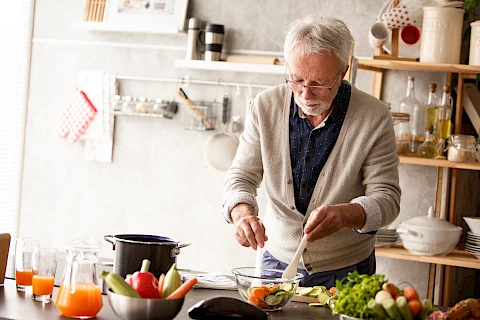
We want to keep our senior loved ones safe. One area where seniors need to feel safe and secure is in the kitchen. Safe cooking practices aren't just about preventing accidents; they also involve ensuring the food is healthy and safe to consume. Our team has compiled a few essential tips for food handling, storage, and kitchen modifications. We also want to discuss how to adapt cooking methods for seniors with physical limitations to help maintain their independence.
Food Handling Safety
The journey to safe cooking starts with proper food handling. Always wash hands with warm water and soap for at least 20 seconds before and after handling food to reduce the risk of transferring harmful bacteria. Use separate cutting boards for raw meat and vegetables to avoid cross-contamination, and wash all surfaces and utensils with hot, soapy water after use.
To prevent cross-contamination, keep raw meat, poultry, seafood, and eggs separate from other foods in grocery bags, refrigerators, and during preparation. Use a food thermometer to ensure that meats are cooked to a safe temperature, reducing the risks of foodborne illnesses.
Food Storage Tips
Proper storage of food is essential for maintaining its safety and quality. To prevent bacterial growth, keep the refrigerator at or below 40°F (4°C) and the freezer at 0°F (-18°C). Store leftovers in airtight containers and refrigerate them within two hours of cooking. Consume refrigerated leftovers within 3-4 days.
Label and date all food items before storing them to make it easier to keep track of food freshness and prevent the consumption of expired items. When thawing food, use the refrigerator, cold water, or microwave. Avoid thawing food on the kitchen counter, which can promote bacterial growth.
Kitchen Safety Modifications
Making minor modifications in the kitchen can significantly reduce the risk of accidents and make cooking a safer experience for seniors:
- Installing non-slip mats and rugs: Place non-slip mats on kitchen floors to prevent falls, especially near the sink and stove.
- Proper lighting in the kitchen: Ensure the kitchen is well-lit to prevent accidents and make cooking tasks easier.
- Accessible storage solutions: Keep frequently used items within easy reach to avoid the need for climbing or bending. Use pull-out shelves and lazy Susans for easier access.
- Using easy-to-handle kitchen tools and utensils: Invest in kitchen utensils with larger, easy-to-grip handles. This will help seniors with arthritis or limited hand strength.
Adapting Cooking Methods for Physical Limitations
Adapting cooking methods can help seniors with physical limitations continue to prepare meals safely. Choose simple, easy-to-follow recipes and pre-chop vegetables, or use pre-cooked ingredients to reduce prep time and effort. Utilize appliances like food processors, slow cookers, and electric can openers to make cooking tasks easier.
Consider cooking in bulk and freezing meals in portion-sized containers. This allows seniors to have ready-to-eat meals without daily cooking. Provide a sturdy chair or stool to encourage seated cooking, which reduces fatigue and improves stability, making cooking safer and more comfortable.
Is Your Senior Loved One Safe in the Kitchen?
Implementing safe cooking practices is essential for ensuring the well-being of our senior loved ones. We can create a safer cooking environment by focusing on food handling, proper food storage, and necessary kitchen modifications. Additionally, adapting cooking methods for those with physical limitations can help maintain their independence in the kitchen. For personalized senior care in Charleston, Mt. Pleasant, Moncks Corner, James Island, and Daniel Island, don't hesitate to contact us. Senior Helpers Charleston is here to support you and your loved ones every step of the way.